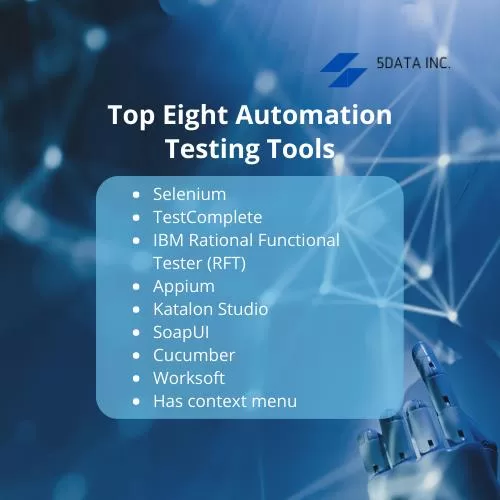Testing is an essential aspect of the software development life cycle, encompassing various testing methods such as unit, integration, system, acceptance, and exploratory testing, ensuring that the software is of superior quality and meets the user’s requirements. These testing advancements have facilitated the production of faster and more cost-effective, high-quality software. Organizations must prioritize test automation to ensure top-notch products, even if it means potentially disrupting release schedules.
The key to a promising return on investment lies in smart test execution and selecting the appropriate tools that align with business needs. Best service vendors provide the testing solutions through the best automated functional testing available services.
What Drives Changes In The Future of Automation Testing?
Automated testing tools are essential in continuous testing and for ensuring that applications are thoroughly and accurately tested.
- The testing process has become faster and more efficient with the incorporation of AI (artificial intelligence) and ML (machine language) technologies.
- Agile and DevOps methodologies demand quick delivery, making test automation even more crucial. Cloud computing further simplifies the testing process by allowing multiple tests to be conducted simultaneously.
- The growth of IoT and mobile apps increases the need for automated testing to ensure seamless functionality.
- As Continuous Integration and Continuous Delivery (CI/CD) become more prevalent, testing must be included in the development process and automated.
- Open-source automated testing tools are becoming increasingly popular due to their flexibility, cost-effectiveness, and collaboration.
- Developing new programming languages and frameworks for test automation makes writing tests that won’t break in the future easier.
Will Automation Testing Be Beneficial For The Future?
Using automated testing not only improves the quality of programs, but automated tests also save time. As new technologies that accelerate automation such as blockchain, AI and ML continues to emerge, the importance of automated testing will only increase.
The demand for test automation engineers is also rising, leading to the development of new tools and rapid advancements in technologies that make automated testing tools more accessible.
In the future, it’s essential to increase the latest test automation trends and test coverage as much as possible and make test automation less complicated and time-consuming.

What Is The Future Of Software Automation Testing?
As new innovations and approaches may emerge in the software testing industry, testing improves user experience through innovative technologies such as AI, ML, and blockchain will become increasingly crucial. Testing distributed systems and test failures in complex architectures will also be essential. It’s important to note that while AI is helpful, it won’t completely replace automation testing.
Market Research Future (MRFR) forecasts that the mobile application testing services market will reach a value of USD 13585.73 Million by 2026, with a growth rate of 20.3% CAGR.
Mentioned below are the top test automation trends and testing tools for 2023.
Cloud-based cross-browser testing
Gone are the times when developers had to create separate codes for individual devices and browsers. Thanks to technological advancements in cross-platform development, automating testing procedures across multiple browsers and testing environments has become essential.
Nowadays, companies opt for cloud-based cross-browser testing methods to reduce infrastructure expenses and improve scalability. This approach allows QA teams to test web applications effortlessly across various device-OS-browser combinations, delivering high-quality products.
DevTestOps
The software testing industry domain is witnessing the latest trend of DevTestOps, which is expected to continue to be popular till 2023. DevOps helps organizations to deploy system changes quickly and efficiently, while DevTestOps further improves deployment quality by enabling continuous and automated testing.
By leveraging CI/CD pipelines with AI, QA teams can enhance automated testing efforts and product delivery processes. The biggest advantage of DevTestOps is the ability to identify bugs before the software’s final release, thus enhancing the overall customer experience. Best automated functional testing services provide automation testing according to the firm’s needs.
Codeless automated testing
Automated testing has been transformed by codeless test automation tools, eliminating the need to write thousands of test scripts and saving time and effort.
Selenium offers reliable and efficient codeless test automation tools, allowing developers to concentrate on product innovation.
Automated regression testing
Automated regression testing ensures that code changes don’t disrupt existing functions. It saves time and detects regression bugs, making solutions more efficient and scalable.
Popular agile testing tools include Selenium, TimeShiftX, and IBM Rational Functional Tester.
Hyper automation testing
A leading trend in automation testing is hyper-automation, which synergizes Artificial Intelligence, Machine Learning, and automation technologies. It enhances the capabilities of humans and provides agile, adaptable, and accelerated product development. QA (quality analysis) testing teams can utilize digital transformation backed by diverse test pipelines to automate the entire testing process and minimize the need for human intervention.
Furthermore with robotic process automation, businesses can utilize cutting-edge technologies like Business Process Management (BPM), Robotic Process Automation (RPA), AI, and ML to attain their objectives.
Non-functional testing
Measuring customer satisfaction is a vital aspect of determining a software development product’s success. It is crucial to conduct non-functional testing to enhance the efficiency and usability of the product and software quality and minimize production risks and costs.
The primary categories of non-functional testing include accessibility testing, security testing, performance testing, infrastructure testing, stress testing, load testing, and disaster recovery testing.
API testing
Developers often rely on third-party libraries and APIs to create web applications and software solutions. Yet, as numerous applications use the same API, testers, and developers must conduct thorough testing to guarantee smooth and error-free performance.
By automating the early stages of the API testing process, QA and development teams can quickly catch and resolve any bugs while enabling effortless integration with third-party API services.
Mobile automation testing
Mobile automation testing will remain a crucial trend in 2023 as mobile devices and the internet become more prevalent. By automating the testing of mobile applications, QA teams can enhance their regression test cases, increase testing efficiency, shorten product delivery time, and guarantee greater customer satisfaction.
Software vendors well versed in mobile testing can provide the best mobile application functional testing services.
Here are the top eight automation testing tools you can consider using in 2023, starting with Selenium.
- Selenium
- TestComplete
- IBM Rational Functional Tester (RFT)
- Appium
- Katalon Studio
- SoapUI
- Cucumber
- WorkSoft
Bottom Line
The future of test automation is in an exciting and dynamic landscape driven by emerging technologies and evolving trends. When automation becomes an integral part of the development cycle, it enables smarter testing processes leading to improved test reporting and analytics thus empowering stakeholders with valuable insights to make informed decisions.
As the industry continues to evolve, testing professionals must embrace these emerging technologies and trends to stay ahead in the rapidly transforming environment of test automation.

